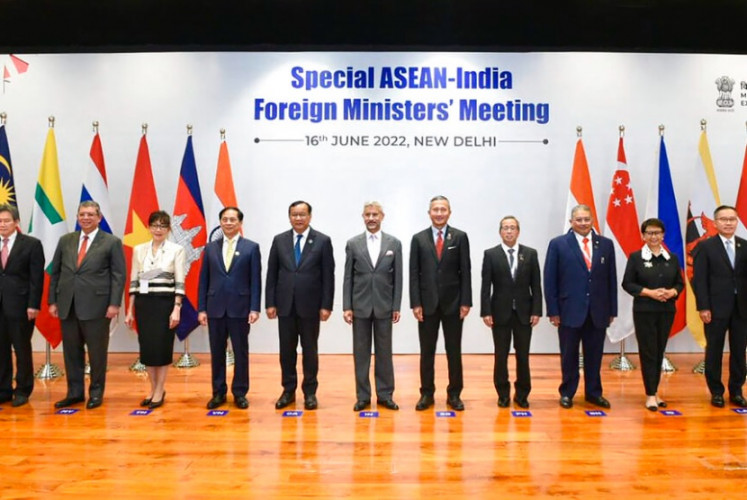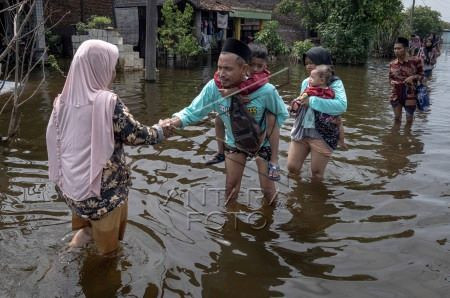Matching growth and sustainability
It is mind-blowing to imagine that the productivity and wealth that have taken thousands of years to achieve will double in a mere 20 years. Population growth, urbanization and economic growth create fantastic opportunities — but also significant challenges calling out for sustainable solutions. This is the case in Asia as well as in Europe
Change Size
 Indonesia and Denmark are both agricultural and maritime nations. (Shutterstock/Carsten Medom Madsen)
Indonesia and Denmark are both agricultural and maritime nations. (Shutterstock/Carsten Medom Madsen)
W
e will face enormous changes over the course of the coming two decades. In the next 20 years, the planet’s population will grow from 7 billion to 9 billion. The middle class will increase with 3 billion people, lifted out of poverty thanks to development. In parallel, the global economy is set to double by 2040.
It is mind-blowing to imagine that the productivity and wealth that have taken thousands of years to achieve will double in a mere 20 years. Population growth, urbanization and economic growth create fantastic opportunities — but also significant challenges calling out for sustainable solutions. This is the case in Asia as well as in Europe.
Today, I arrive in Jakarta on a three-day working visit focused on discussing joint solutions to the challenges and opportunities of the 21st Century. On the surface, our two countries might be as different as can be. But the truth is that we can achieve much more by working closely together in partnerships aimed at developing the state-of-the-art solutions.
That is why a partnership between Southeast Asia’s largest country and a small country like Denmark makes sense. And let’s not forget that Indonesia and Denmark are — despite our obvious differences — both agricultural and maritime nations. We also share a desire to find ways to square the circle on one of the key questions of our time: How do we effectively respond to global shifts and challenges by increasing productivity and growing our economies in a sustainable way that does not harm the environment?
In the environmental sector, Indonesia and Denmark have been working together over the past decade to identify solutions to environmental and energy challenges under our US$ 50 million development program. Take for example our activities in Cilacap in Central Java.
Together with Indonesian partners, we are developing innovative solutions to transform solid waste from landfills into fuel to be used by a private cement company.
In Semarang, Denmark is supporting the introduction of gasification systems in the local landfill. This will create affordable energy for households in the area. Every year, Indonesia produces 64 million tons of solid waste. Much of this ends up in open landfills, or in the nature or oceans. By introducing such new technology, a lot of waste can be turned into energy.
That is good for the economy and the environment alike. And in Jakarta, Danish technology and urban planning are already at work assisting the city administration with flood-control to help prevent the annual flooding, which I look forward to discussing with Governor Basuki during my visit.
We are also working together by sharing regulatory experiences. Denmark’s green transition did not occur out of an initial desire to save the planet, or due to a booming economy. The change came in response to an energy crisis caused by the spike in oil prices in the 1970s.
It was an economic necessity, and it was to a large extent imposed through government regulations. Out of such changes, new business opportunities emerged. That is why Denmark is among the world leaders in green solutions. Green technologies increasingly contribute to our economy.
New technology can also assist Indonesia in enhancing the productivity of the agribusiness sector, which is among the Government’s key priorities. Take livestock as an example: Utilizing new technology in relation to something as simple as temperature-control in chicken production can with very limited investment increase output with 5 to 10 percent. Or aqua-culture where fish farm technology can put healthy, affordable and sustainable fish on the table.
Another example is the palm oil industry and the vision of making the sector fully sustainable. With the introduction of enzymes into the palm oil production process, one can increase the productivity of the sector with up to 10 percent, thus reducing the need for expanding plantations.
Our envisaged cooperation in other words has both a government-to-government and a business-to-business dimension. Because innovative solutions are often best achieved by creating public-private partnerships.
During my visit, I am accompanied by officials from the Danish Veterinary and Food Administration the Danish Nature Agency, as well as the Confederation of Danish Industry, and the Danish Agriculture and Food Council representing thousands of Danish companies. Drawing on a wide range of actors is key in developing the tailor-made solutions that will assist Indonesia realizing its full potential.
As a concrete sign of our partnership, my counterpart Indonesia’s Minister for Agriculture Amran Sulaiman and I will sign a cooperation agreement paving the way for stronger collaboration between the public and private sectors in Indonesia and Denmark.
This will increase trade and investments, facilitate the sharing of knowledge and experience on food security and safety, and enable the transfer of innovative technologies that will improve productivity and efficiency in the agricultural sector. Without harming the environment.
By strengthening our partnership, Indonesia and Denmark can in other words demonstrate that there is no contradiction between growth and sustainability. In fact, sustainability is just good business.
---------------
We are looking for information, opinions, and in-depth analysis from experts or scholars in a variety of fields. We choose articles based on facts or opinions about general news, as well as quality analysis and commentary about Indonesia or international events. Send your piece to community@jakpost.com.








